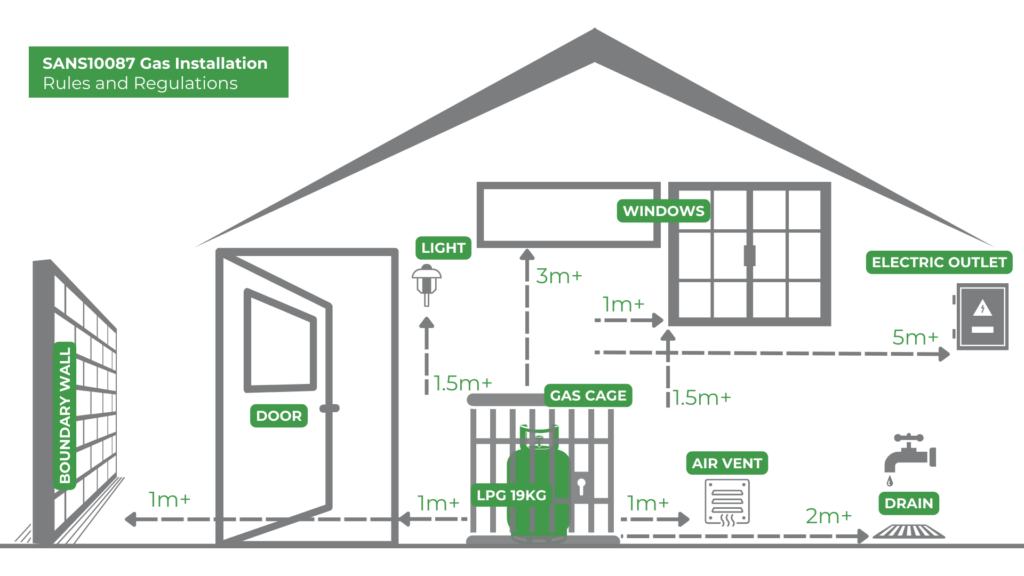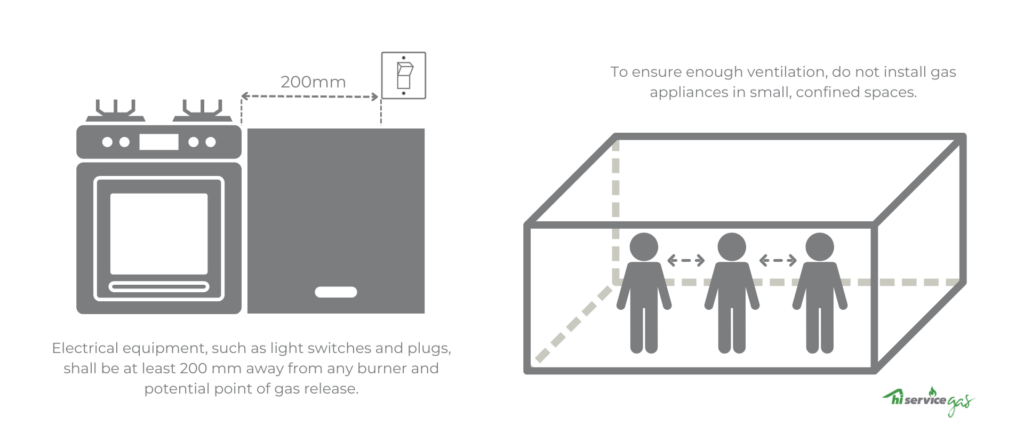Working with LPG is a significant responsibility, and as a result, South Africa has a set of rigorous rules, standards and regulations that must be adhered to. These regulations are mainly designed to adhere to industry safety standards and to protect you as an end user of any gas appliance. Receiving a gas certificate of compliance for any fixed gas line and gas appliance installations is a component of these regulations.
In this article, we are taking a brief look at the basic safety regulations surrounding a gas certificate of compliance and why they are important.
What is a gas certificate of compliance?
The short answer is that it ensures all gas installations and appliances are safe and, as a result, comply with the South African National Standard (SANS).
To quote the South African Qualification and Certification Committee (SAQCC): “According to the regulations that were introduced in 2009, all gas installations must have a Certificate of Compliance (COC) according to the Pressure Equipment Regulations that have been promulgated under the Occupation Health and Safety Act (No 85 of 1993) – effectively stating that the installation has been properly inspected and is determined to be safe and leak free.”
What is a fixed gas supply?
A fixed gas supply is the gas line that is installed with your gas geyser, gas fireplace, or a built in gas hob, or gas stove. The most straightforward method of comprehending the concept of a fixed line is to note that it is not feasible to detach it and take it camping. It is not portable and cannot be transported. When an LPG supply line is not permanently installed, the orange pipe is typically connected directly to the gas hob, and both are transportable or moveable.
When do you need a gas certificate of compliance?
You need a gas certificate of compliance when you:
- Make a change or adjustment on a fixed gas line installation.
- When you change a gas appliance.
- When you add gas appliances.
- Sell and transfer properties that have a fixed gas line and gas appliances.
What basic rules and regulations apply to gas installations?
General LPG regulations:
- Maximum LPG Allowed per property:
- Up to 9kg is allowed inside an apartment.
- Up to 19kg is allowed inside a freestanding house.
- Up to 100kg is allowed outside a building on any earth but this may be subject to the local municipal bylaws which differ from area to area.
- If an excess of 100 kg must be stored on your premises, a special application will have to be submitted at your local Fire and Safety Department. (See image with more details here.)
- LPG gas hoses to connect to cylinders must be replaced at every 5 years or sooner if they show any cracks in the surface.
- Regulators may not be older than 10 years.
- All gas appliances and installations should be inspected for leaks and safe operation every 12 months.
- Only SABS approved appliances with a valid permit number (LPGSA safe appliance verification)
Regulations for gas fix supply:
- Must be installed by an accredited LPG service provider.
- LPG bottle must be placed on a solid and stable surface.
- Must never be placed in a garage.
- See the image for the safety distances outside:
- No less than 1 metre sideways from doors and windows (unless a boundary wall is installed).
- No less than 1 metre from an air vent.
- No less than 2 metres from drains, manholes or pits.
- No less than 3 metres below windows unless a non-combustible roof (corrugated roofing or nutec boards) has been installed between the gas bottles and the bottom of the window may be reduced to 300mm.
- If a non-combustible roof is installed, it may be reduced to no less than 1.5 metres.
- No more than 2 cylinders are used, no less than 1 metre from the property boundary wall unless it is a fire wall, in which case the cylinders may be placed directly against the boundary.
- No less than 5 metres sideways away from an electrical source such as an electrical point, plug switch, socket, electrical motor, or pool pump etc.
Any outdoor light, no less than 1.5 metres above the gas cylinder valve.

For more regulations with the City of Cape Town, please find them here.
Regulations for gas hob and stove installations:
- Install appliances on a firm, solid, and level foundation.
- Do not install a gas appliance in a strong draught that will extinguish a burner set on a low flame.
- To ensure enough ventilation, do not install gas appliances in small, confined spaces.
- Ensure that the gas appliances are not situated in a space where combustible furnishings or ignitable materials can be set on fire. For example, gas hobs cannot be installed near curtains or cleaning materials.
- Electrical equipment, such as light switches, stove isolator and plugs, should all be at least 200 mm away from any burner and potential point of gas release.

You can further your knowledge of South African rules and regulations for successful gas appliance installations in our blog here.
What will a gas compliance certificate cost?
We cannot speak for other companies, but at Hi Service Gas, a gas compliance certificate inspection costs R661.25
If any repairs or modifications are necessary, we will provide a quote. Once the gas line or appliances have been brought up to standard, we can proceed with issuing the gas COC.
(*rate provided in June 2024 – subject to change.)
How will I receive a gas COC?
Once a full inspection has been concluded and all tests have been passed, you will receive a gas COC.
Gas COCs are no longer issued in paper format but are now directly issued online via e-mail. You can read the information in this letter by the SAQCC.
What must I do if my gas appliances or gas lines are not compliant?
Ask a registered gas installation company to fix all the issues, make the changes and repairs where required. The licenced LPG installation professionals will then automatically provide the COC after the repairs are completed.
Safety Tip: You should never attempt to fix gas-related issues yourself.
Hi Service Gas is certified and has vast experience to assist with residential and commercial gas COC inspections, gas compliance certificates, gas installations, SABS approved gas appliances, and repairs.
Call us when you need great gas.
Hi Service Gas – Simplicity and Efficiency Beyond Electricity.
This article was written by a human.
